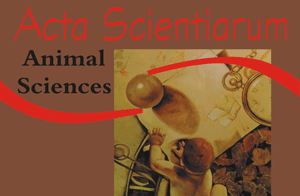ABSTRACT.
Food production in a sustainable way is based on the association between animals and vegetables to minimize costs, environmental impact, and the use of insums in the breeding process. The objective of this work was to evaluate the effect of the inclusion of pumpkin seed flour (Cucurbita pepo L.) in the diet on the performance of early-stage pigs and the reduction of endoparasites in a commercial rearing system. The experimental design was completely randomized, with three treatments and six replicates, and the experimental unit consisted of two animals, totaling 36 animals. The treatments were the basal diet and two levels of inclusion of pumpkin seed: 5 and 10%. The animals were of the Agroceres line, with 42 days of age and an average weight of 12 kg. The animals and rations were weighed at the beginning and at the end of the 35-day experimental period to obtain the performance variables. A bromatological analysis was performed to evaluate the composition of pumpkin seed and for parasitic analysis, feces were collected individually from the animal. There was no significant effect for the Tukey test at the level of 5% probability, of the inclusion of pumpkin seed flour on in the parameters of weight gain and feed conversion. Was observed the reduction of helminth eggs present in feces using egg count and oocysts per gram of feces (OPG), performed at the beginning and end of the experiment. It is indicated the inclusion of 10% of pumpkin flour in the feeding of pigs in the initial phase by reducing contamination by verminosis and does not alter animal performance.
Keywords:
pumpkin seed; piglet nutrition; alternative food; natural vermifuges.

 Thumbnail
Thumbnail
 Thumbnail
Thumbnail

